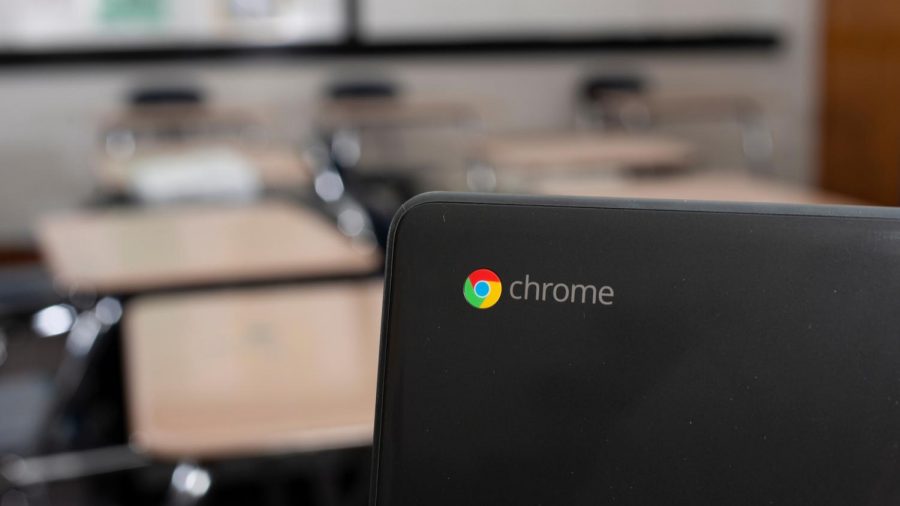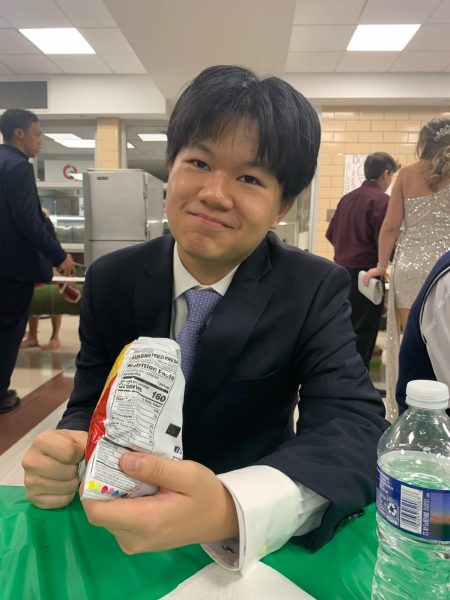What’s the deal with our Chromebooks?
December 18, 2021
Since our return to in-person learning, some students have noticed that their peers have different Chromebooks than theirs. Whether it’s the design or the hardware you’re looking at, these claims do have some merit. During an interview with sophomore student Nicolas Arisi-Fernandez, they stated, “The school gave me a Dell Chromebook from the school during the beginning of virtual. I didn’t think much of it. I began to notice a few students with newer computers. I just assumed that students were bringing in their personal laptops. After a while though, I started to notice that they were also running Chrome and not Windows. Do some students have a certain advantage or disadvantage over others with these differences?”
There are two main types of Chromebooks you may see around the school. The first and the most common is the Dell 3100. The latter and somewhat rarer is the Lenovo 300e. Some in the student population have debated that the Lenovo 300e laptops have more features than the Dell 3100 laptops and that Lenovo is known for more premium products in the technology world. After investigating this matter myself and asking around, I decided to interview our school’s Director of Innovation, Brandon Lutz.
Part I: Chromebooks
Q: Why do we have different Chromebooks?
A: Initially, we ordered Lenovo 300e devices for all students in the 1-to-1 program in April (senior high), May (junior high), and June (elementary) 2020. We did receive our first order of Lenovo 300e devices in late August 2020. The length of the delay was not known at the time, but we later learned it could be up to 8 months. When we found an opportunity to purchase Dell 3100 2-in-1s (in place of the Lenovos) in just two weeks’ time, we made the decision to get devices into students’ hands as quickly as possible for virtual learning. Both the Dell 3100 and the Lenovo 300e have the same tech specs and are comparable devices with two exceptions.
Q: Is it possible for students to trade in their laptops for newer models?
A: No. There is no newer model. Both models are manufactured the same year and the device specs are the same except for a world-facing camera on the Lenovos (built into the keyboard), and the Dells have an accessibility feature that allows live closed captioning, which the Lenovo does not.
*Device Comparison Sheet: Note both devices have 4GB of Ram.
Q: Do all grade levels receive the same technology?
A: Due to the pandemic, we provided the devices we had at the time to families that had the greatest need. So all grade levels from 4 to 12 could have a Lenovo 300e or Dell 3100 2-in-1s.
Q: Does a Chromebook/charger repair or replacement come at a cost to the student?
A: Students can buy a replacement charger at a cost of $20 if they misplace their charger. If a charger stops working, the students can hand in the broken charger and get a free replacement.
Q: Statistically, how much did the different Chromebooks cost the school?
The Dell 3100 was more expensive because of supply and demand during the pandemic. Cost of the devices vary when making purchases based on a variety of factors in regular times.
Q: Was there a supply issue?
A: Yes, it took us 5 months to get two of our Chromebook orders delivered.
*Please see this news article from August 23, 2020.
Q: How are the parts for Chromebook repair brought in?
A: If a Chromebook needs repair from failure or accidental damage, we have a manufacturer extended warranty and accidental protection on all of the Chromebooks. When a repair is needed, we send the device out and provide a replacement device or loaner to the student at no additional cost to the student of the district.
Q: What is the average repair time for a Chromebook?
A: Repairs can take up to 3 months due to the shortage of parts. Our repair company just provided new devices instead of repairing devices because it was easier to get new devices over parts.
Q: When a Chromebook is being repaired, is the student provided with a temporary replacement? This is due to widespread or even required usage in many of the post-pandemic classrooms today for Jamboard, Peardeck, Desmos, My AP, watching videos independently, lab reports, etc.
A: Yes, we provide a replacement device to the student when it goes out for repair. We provide a spare device and the student can just use that as their own going forward. In some cases if the student has stickers or cosmetic wear on the device, then we will give them a loaner and swap the device when there’s is repaired.
*Please see the Chromebook protocol sheet that is fluid and does change as new needs or questions arise.
Q: When senior year arrives, do the students have to return the Chromebooks to the district?
A: Yes, at the end of students’ senior year, or if they leave the district, they must return the Chromebook just like a textbook. The devices collected from this year’s seniors will go down to the incoming 4th grade for next year after being wiped, cleaned, and fixed as needed.
Q: How long does the Abington School District Technology Department expect the current Chromebooks to last?
A: We plan to use them until they reach Google’s Auto Update Expiration (AUE) date, which for this batch of Chromebooks is June 2026.
Q: What is the current budget for not just Chromebooks, but for technology in general?
A: Technology funding comes from several different budget lines, depending on the nature of the item/device, its purpose, etc. For example, technology funding for the new installations at the high school has been incorporated as part of the Additions and Renovations Project Budget, whereas investing in new software for classroom instruction would come from the Teaching and Learning Department. Funding for implementing the 1:1 student-to-computer ratio program was part of the Digital Transformation Plan, which was funded by the technology budget. We were also able to roll out the plan faster with COVID-19 grant money.
*You can find the 2021-2022 final general fund budget approved by the Board in June, please click here. For the original Digital Transformation Plan, click here.
Q: Some students argue that the district could have spent money more wisely on Windows operating system laptops. What is the case against them?
A: During the 2019-2020 school year, a Superintendent’s Committee regarding Innovative Instruction was established to help inform the implementation of the District’s Digital Transformation Plan. Made up of administrators, teachers and staff, board members, students and community members, the Committee discussed device options and determined that a Chromebook would be the most fitting option for implementing our 1:1 program. Before the development of the plan, device input was also received from students through a technology audit that was conducted by the Montgomery County Intermediate Unit. Feedback from both initiatives helped guide the type of features we sought in our ultimate device selections. Chromebooks are cloud-based devices, which means they require less maintenance, are less costly to run, and integrate better with Google platforms. Plus, they are touch screens and cost less for the accidental protection warranty. Windows laptops require additional software licenses to run programs, which increases costs and chances for additional maintenance and issues down the road.
Part II: Promethean Boards
Some teachers have experienced numerous issues with the new touch screen Promethean boards throughout the beginning of the school year. Such issues include flashing screens, unresponsive screens, and sound/audio issues.
The Promethean devices at the Senior High are world-facing, called ActivePanels. There are also Promethean boards at the Junior High and elementary schools that are 12 years old. In the digital transformation plan, these should have been replaced, but due to the pandemic and expediting the 1-to-1, this replacement had to be postponed. We are currently starting a pilot for the Junior High and elementary schools to look at options for technology to replace the Promethean boards.
Q: What were the main issues you found with the Promethean boards, and how were they fixed?
A: The ActivePanels had some issues with the HDMI connection through the wall that we worked with the construction teams to remediate. We have had some issues with the docks, which have caused some of the issues that we are currently working through. Teachers contact the help desk and technical analysts come out and help fix the problems with the panels.
Q: Do you have any advice for the teachers who are experiencing trouble with Promethean boards?
A: If teachers are having trouble with the technology, they should contact our technical support resources by submitting a ticket or calling the hotline.
Q: I am glad these issues have been fixed. There is a lot of technology in the schools so the Tech Team is busy! How much have these repairs cost the school?
A: The Active Panels are under warranty, so no cost for repair.
Q: What can we, in the student and teacher body, do to make your jobs easier?
A: Part of the Digital Transformation Plan is to start a student technology team that can help with the management and simple troubleshooting of the Chromebooks. We also ask that you treat your devices with care and respect so our Tech Team can dedicate their time to troubleshooting other areas when needed.
Q: Is there a current backlog of any sort regarding technology?
A: There are currently chip shortages and shipping delays on a lot of products. Currently, we are waiting on laptops for administrators and docking stations for the classrooms.
Q: Do you feel the technology department requires more funding?
A: Abington School District’s administration works hard to develop a balanced budget that addresses myriad needs across our nine schools and other buildings. The number one goal is delivering a high-quality education to all students, and it is evident that this administration understands that technology is one of the best means to achieve that goal.
Q: Are there any issues or comments you would like to express to the school community?
A: The Technology and Innovation Department is striving to provide timely, consistent support to students, teachers, parents, and staff across the Abington School District. We appreciate everyone’s patience as the amount of technology and systems we support has grown exponentially and we are doing our best to prioritize and respond to everyone’s needs.
A special thanks to all of the staff members of the Abington Technology Department:
Brandon Lutz – Director of Innovation
Matthew Snead – Supervisor of Technology
Brian Whelan – Network Administrator
Adele Rossi – Administrative Assistant
Vincent Bevivino – Technical Specialist
Philip Cho – Technical Analyst
Richard Greene – Technical Analyst
Geffrey Hayes – Technical Analyst
Edward Isen – Programmer Analyst
Pamela McLaughlin – Technical Specialist
Michael Wilkins – Technical Analyst
If you need technology assistance or resources, please contact:
Email: [email protected]
Voice: 215-517-2700
Fax: 215-881-2593


